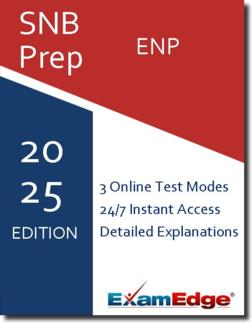SNB ENP (SNB-ENP) Practice Tests & Test Prep by Exam Edge - FAQ
Based on 34 Reviews
- Real Exam Simulation: Timed questions and matching content build comfort for your SNB ENP test day.
- Instant, 24/7 Access: Web-based SNB Enrolled Nurse (Psychiatric) (ENP) practice exams with no software needed.
- Clear Explanations: Step-by-step answers and explanations for your SNB exam to strengthen understanding.
- Boosted Confidence: Reduces anxiety and improves test-taking skills to ace your SNB Enrolled Nurse (Psychiatric) (ENP) (SNB-ENP).

Why should I use Exam Edge to prepare for the SNB Enrolled Nurse (Psychiatric) (ENP) Exam?
FAQ's for Exam Edge SNB Enrolled Nurse (Psychiatric) (ENP) practice tests
- Comprehensive content: Exam Edge's SNB Enrolled Nurse (Psychiatric) (ENP) practice tests are created specifically to prepare you for the real exam. All our SNB ENP practice test questions parallel the topics covered on the real test. The topics themselves are covered in the same proportions as the real test too, based on outlines provided by the Singapore Nursing Board in their SNB ENP test guidelines.
- Realistic practice: Our SNB ENP practice exams are designed to help familiarize you with the real test. With the same time limits as the real exam, Our SNB practice tests enable you to practice your pacing and time management ahead of test day.
- Detailed explanations: As you complete your practice tests, we show you which questions you answered correctly and which ones you answered incorrectly, in addition to providing you with detailed step-by-step explanations for every single SNB Enrolled Nurse (Psychiatric) (ENP) practice exam question.
- Performance insights: After you complete a practice test, we provide you with your raw score (how many you answered correctly) and our estimate of the SNB ENP score you would have received if you had taken the real test.
- Ease of access: Because all Our SNB practice tests are web-based, there is no software to install. You can take SNB ENP practice exams on any device with access to the internet, at any time.
- Flexible use: If you must pause while taking one of Our SNB practice exam, you can continue right where you left off. When you continue the test, you will start exactly where you were, and with the same amount of time you had remaining.
- Thousands of unique questions: We offer 10 different online practice exams with 1,000 unique questions to help you prepare for your SNB Enrolled Nurse (Psychiatric) (ENP) !
- Low cost: The cost of ordering 5 practice tests is less than the cost of taking the real SNB ENP test. In other words, it would be less expensive to order 5 practice tests than to retake the real SNB Enrolled Nurse (Psychiatric) (ENP) exam!
- Our trusted reputation: As a fully accredited member of the Better Business Bureau, we uphold the highest level of business standards. You can rest assured that we maintain all of the BBB Standards for Trust.
- Additional support: If you need additional help, we offer specialized tutoring. Our tutors are trained to help prepare you for success on the SNB Enrolled Nurse (Psychiatric) (ENP) exam.
What score do I need to pass the SNB ENP Exam?
To pass the SNB Enrolled Nurse (Psychiatric) (ENP) test you need a score of 72.
The range of possible scores is 0 to 100.
How do I know the practice tests are reflective of the actual SNB Enrolled Nurse (Psychiatric) (ENP) ?
At Exam Edge, we are proud to invest time and effort to make sure that Our SNB practice tests are as realistic as possible. Our practice tests help you prepare by replicating key qualities of the real test, including:
- The topics covered
- The level of difficulty
- The maximum time-limit
- The look and feel of navigating the exam
Do you offer practice tests for other Singapore Nursing Board subjects?
Yes! We offer practice tests for 7 different exam subjects, and there are 155 unique exams utilizing 15500 practice exam questions. Every subject has a free sample practice test you can try too!
SNB Advanced Practice Nurses (SNB-APN)
Practice Tests
SNB Clinical Nursing Education (SNB-CNE)
Practice Tests
SNB Enrolled Nurses (SNB-EN)
Practice Tests
SNB Enrolled Nurse (Psychiatric) (ENP) (SNB-ENP)
Practice Tests
SNB Midwives (SNB-MW)
Practice Tests
SNB Registered Nurse (SNB-RN)
Practice Tests
SNB Registered Nurse (Psychiatric) (RNP) (SNB-RNP)
Practice Tests
To order tests, or take a sample test, for a different subject:
Click on ' Name on the Exam Name' You will be take to the orders page
How do I register for the real Singapore Nursing Board ?
For up-to-date information about registration for the Singapore Nursing Board , refer to the Singapore Nursing Board website.


